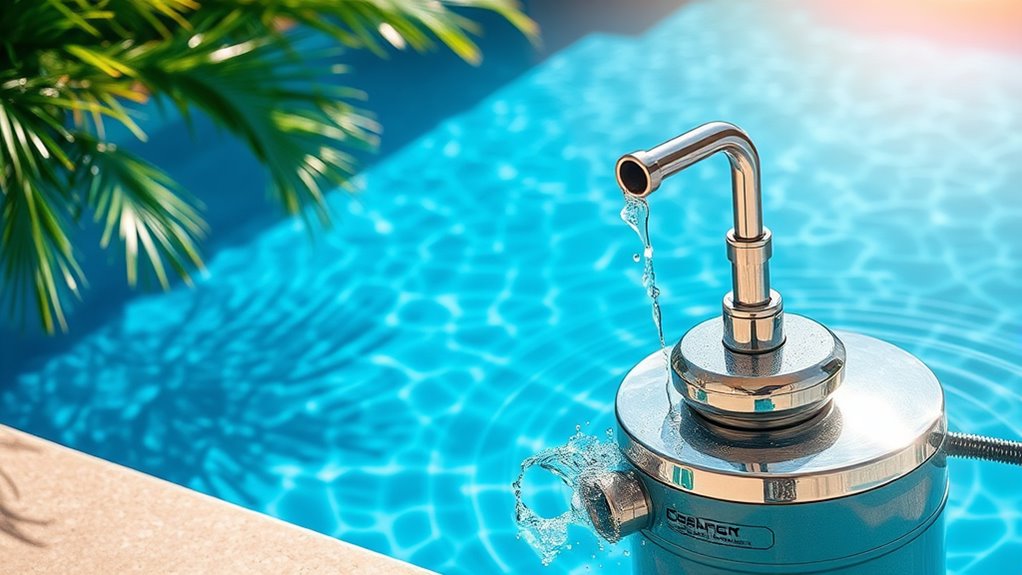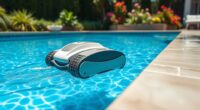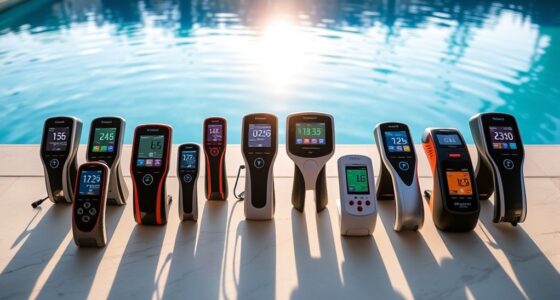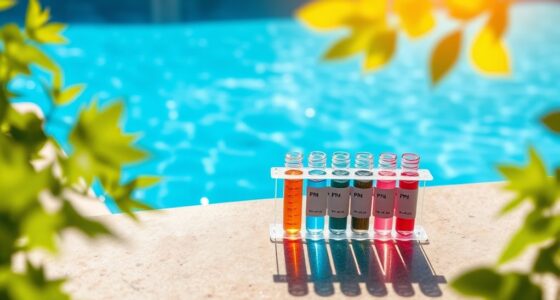When it comes to keeping your pool water clean, choosing the right filter is key. Sand filters are great for larger pools and handle a lot of water but miss the tiniest debris. Cartridge filters capture smaller particles and are more affordable. If you want crystal clear water, DE filters are the best option, though they require more maintenance. Each filter type has its pros and cons, so there’s more to explore about making the best choice for your pool.
Key Takeaways
- Sand filters are efficient for large pools but may miss fine debris, filtering down to 20-40 microns.
- Cartridge filters provide a balance, capturing particles down to 10-20 microns with lower maintenance needs.
- DE filters offer the highest water clarity by filtering out particles as small as 2-5 microns, though they require intensive maintenance.
- Regular maintenance, including cleaning and media replacement, is essential for all filter types to ensure optimal performance.
- Consider pool size, local debris, and maintenance preferences when selecting the right filter type for clean water.
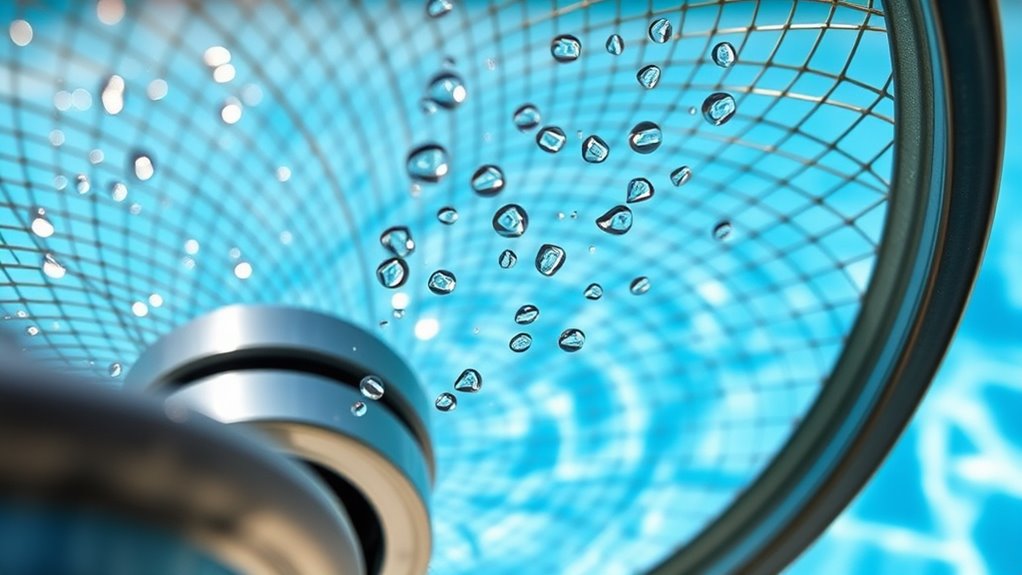
When it comes to keeping your pool sparkling clean, choosing the right filter is vital. You’ve got a few options to take into account, each with its unique strengths.
Sand filters, for instance, are great for handling large volumes of water efficiently, making them suitable for bigger pools. They filter particles down to about 20–40 microns, so while they’re effective, they don’t capture the smallest debris as well as other types.
Sand filters efficiently manage large volumes of water, making them ideal for bigger pools, although they miss the tiniest debris.
If you’re looking for something that captures smaller particles, you might want to explore cartridge filters. These filters can get down to 10–20 microns, providing a consistent flow rate that enhances filtration efficiency. They’re more affordable than diatomaceous earth (DE) filters and require occasional cleaning and replacement of cartridges, making them a good middle-ground choice.
For the ultimate water quality, DE filters are hard to beat. They filter out particles as small as 2–5 microns, guaranteeing your water stays crystal clear. However, they come with a cost—their maintenance can be intensive, requiring frequent grid cleaning. Additionally, they’re the most expensive type of filter, so that’s something to keep in mind when making your decision.
When evaluating filter size and location, remember that in-ground and above-ground pool filters differ mainly in size and location. Larger pools often benefit from sand or DE filters because they can handle high volumes efficiently. If you’ve got trees around your pool, DE filters can be particularly useful as they excel at capturing fine debris that might otherwise cloud your water.
Maintenance is another vital aspect. Regular cleaning and occasional replacement of media are necessary for all types of filters. Sand filters generally have lower operational costs compared to others, while cartridge filters need replacement more often. Properly maintained DE filters can last several years, but their higher initial price and maintenance needs can be a deterrent for some pool owners.
Ultimately, your choice of filter will depend on various factors, such as pool size, local climate, and how much debris your pool is likely to accumulate. By taking the time to evaluate your options and reflecting on your specific needs, you can guarantee your pool remains a clean and inviting oasis all summer long.
Frequently Asked Questions
How Often Should I Replace My Pool Filter?
You should replace your pool filter based on its type and usage.
Cartridge filters typically need replacement every 1 to 2 years, while heavy use might bring that down to as little as 6 months.
For sand and DE filters, keep an eye on pressure readings and visible wear.
Regular maintenance and cleaning can help extend their lifespan, but always watch for signs that indicate it’s time for a change.
Can I Clean My Filter Instead of Replacing It?
Yes, you can clean your filter instead of replacing it, but it depends on its condition.
Regular cleaning can extend its lifespan, but if you notice damage or a drop in efficiency, it’s time to replace it.
Use a stiff brush and hose to clean it, and consider specialized cleaners for better results.
Just make sure to check the pressure gauge; if it’s consistently high, cleaning mightn’t be enough.
What Size Filter Do I Need for My Pool?
To determine the right size filter for your pool, you first need to calculate its volume based on its shape.
For rectangular pools, multiply length by width and average depth. If yours is circular, use the formula radius squared times 3.14 and average depth.
Once you have the volume, consider the filter type and match it to your pool’s flow rate. This guarantees efficient filtration and keeps your water crystal clear.
Are There Eco-Friendly Filter Options Available?
Yes, there are eco-friendly filter options available for your needs.
You can choose from cellulose fiber filters, which are biodegradable, or FilterBalls that are recyclable and long-lasting.
Cartridge filters are also a great choice since they conserve water by eliminating backwashing.
These options not only reduce waste but also lower your chemical usage and energy costs, making them a smarter, greener choice for maintaining cleanliness in your pool.
How Do I Troubleshoot a Malfunctioning Pool Filter?
So, you’ve got a pool filter acting like a stubborn teenager, huh?
To troubleshoot a malfunctioning filter, start by checking the pressure gauge—high or low readings signal specific issues.
Inspect for blockages in skimmers and pumps, and make sure the water level’s adequate.
If it’s still acting up, clean or replace the filter.
Don’t forget to look for leaks around seals or clamps; they can be sneaky!
Conclusion
In conclusion, pool filters are like the lungs of your swimming pool, breathing life into the water by keeping it clean and clear. Without them, your oasis would quickly turn murky and uninviting. By regularly maintaining your filters, you guarantee a sparkling environment for you and your loved ones to enjoy. So, take a moment to appreciate these unsung heroes of your pool, and plunge into a revitalizing experience all summer long!
